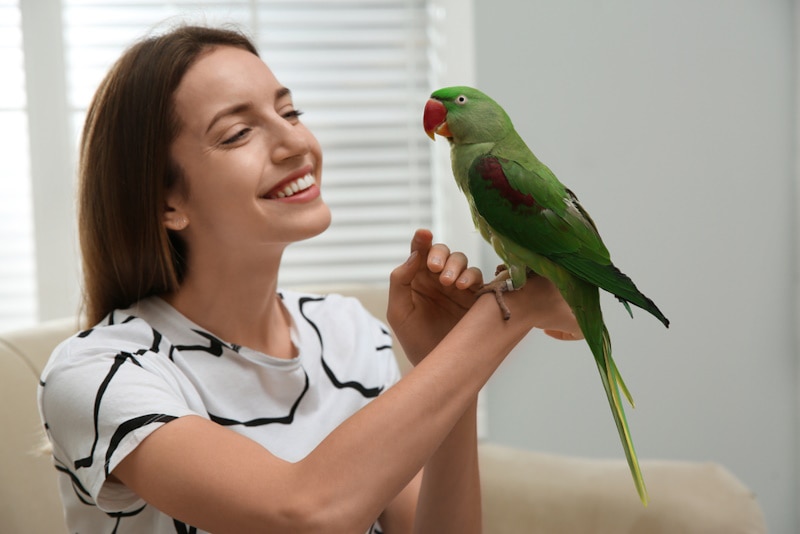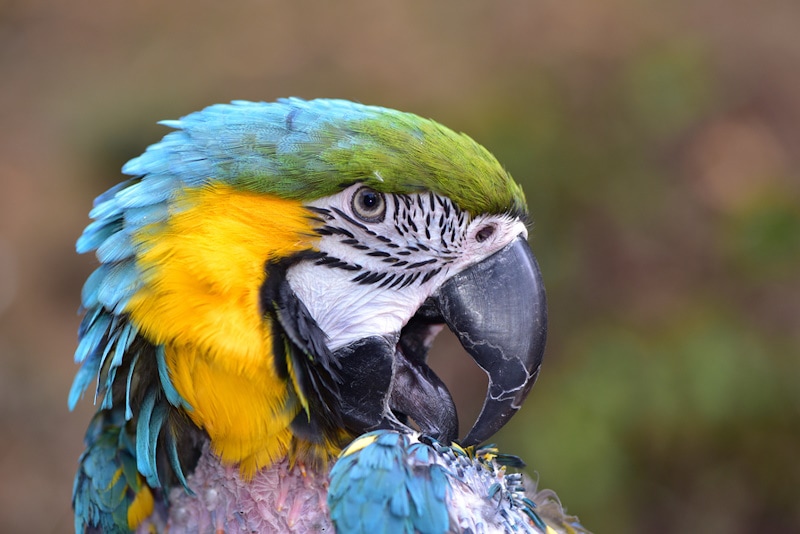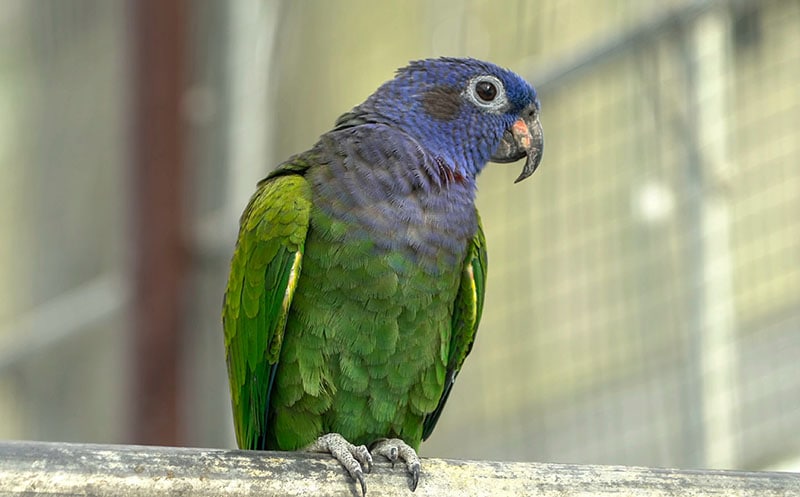How Much Does It Cost to Get a Parrot? 2024 Price Guide

Updated on
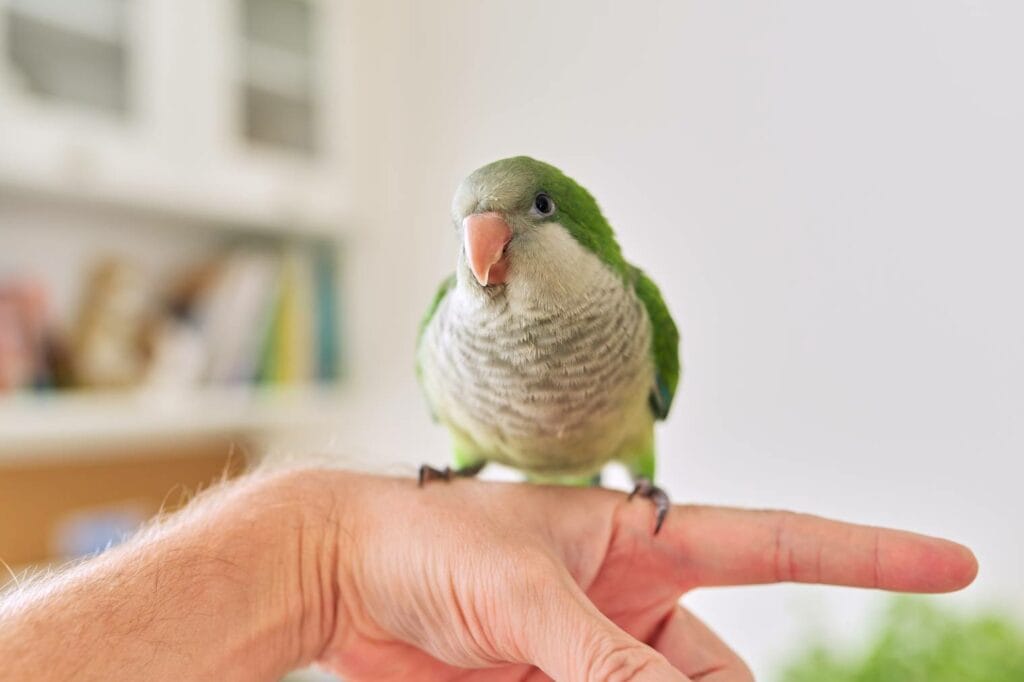
Click to Skip Ahead
With their colorful feathers and entertaining personalities, it’s no wonder why parrots are such desirable pets. While you may be yearning to make one of these talented talkers part of the family, you can’t overlook the value of proper research and budgeting.
Unfortunately, many people overlook the actual cost of owning a parrot that can go around $70–$350 per month. Alongside the upheaval to the daily routine and the raucous noise level, the unexpected initial cost and ongoing upkeep can leave many owners looking to rehome their birds.
Situations like these are unfair to you and your parrot. To ensure you’re making the best decision for your home, we’ll explore how much it costs to get a parrot.
Bringing Home a New Parrot: One-Time Costs
Initial parrot ownership costs can vary considerably due to the vast assortment of parrot species. There are over 400 parrot varieties on the planet. Owners can bring home birds as small as a 5-inch-long Parrotlet or as large as a Hyacinth Macaw, which can stretch to over 3 feet long!
Larger birds typically cost more. If the parrots aren’t more expensive, their supplies will cost more than those for a Budgie, Cockatiel, or Conure. The bird’s rarity and skills can also affect the price. The articulate African Grey, for example, will cost significantly more than others due to their ability to mimic human speech.
Fortunately, you can find nearly any pet species at several price points due to the high number in shelters, sanctuaries, and foster homes.
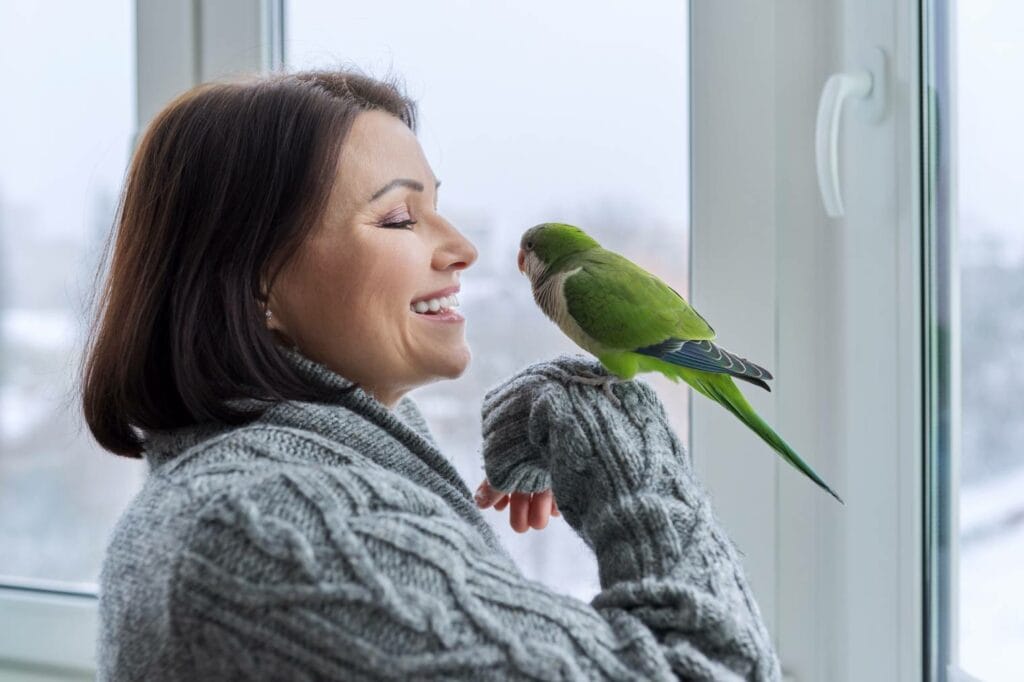
Free
Finding a free parrot in your area may not be as challenging as you might think. Birds are the fourth most popular pet group in the U.S., and compared to most companion animals, parrots are more likely to change homes.
Many people buy parrots on a whim, underestimating or not considering their care needs or the noise level they bring to the house. Even when the owners are capable and considerate, there’s still a high chance that their birds will change hands. While smaller domesticated birds like parakeets may only have 15–20-year lifespans, Cockatoos, Macaws, and many large varieties can live to over 60 years.
Captivity generally stunts the lifespan of most parrots. However, many will still live for decades with proper care, often outlasting their owners. In those cases, even the most beloved birds will find themselves in limbo and ready for a new family. You may have luck locating local birds through classified ads or contacting a local avian veterinarian for help.
Adoption
- $15–$2,000
As with dogs and cats, animal advocates urge potential parrot owners to adopt before buying. Parrots can change owners up to 11 times in their lifetime, leaving the rotation of adoptable birds perpetually full. You can check your local shelters for parrots. Rescue organizations have a healthy online presence, giving you access to needy parrots nationwide. You can also find birds on general adoption websites like Petfinder.
Rescues and shelters have strict adoption requirements to ensure their birds only go to responsible owners. Many make home visits to assess the parrot’s environment and demand owners take certain courses and acquire specific supplies. The adoption process can take several months to complete in many cases.
The time commitment for adoption may be worth it, as adoptable pets are much less expensive than purchased pets. Alongside the emotional benefit of helping a parrot in need, you also save thousands of dollars on some of the planet’s most exotic species.
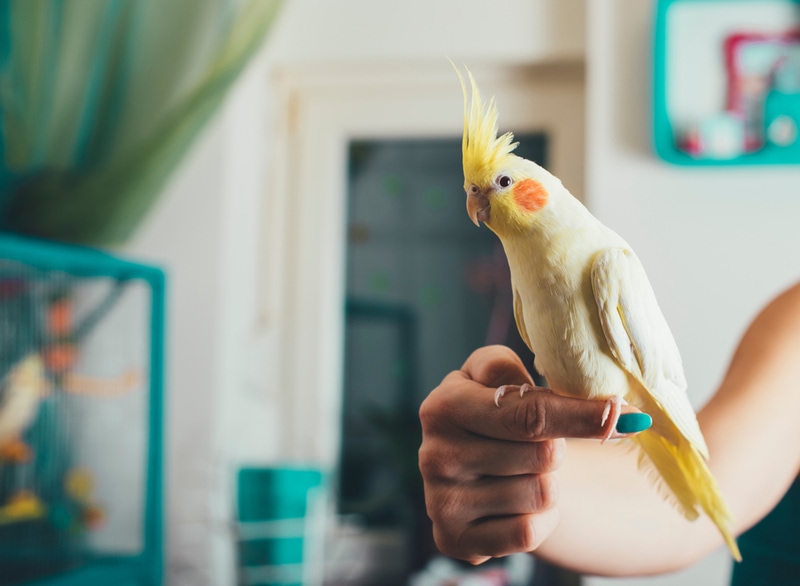
Breeder
- $20–$15,000+
Buying from breeders offers the most confidence in the quality of the birds, but you must vet sellers carefully. Unscrupulous breeders may have low-priced parrots with health issues or raise their animals in inhumane conditions. Be wary of breeders who rush the sales process or won’t let you visit their facilities. To find parrot breeders by state, check the birdbreeders.com database.
Smaller parrots are the least expensive. The ever-popular Budgerigar is often available for under $30, while birds like Lovebirds and Cockatiels often run $50–$400. Once you look at talented parrots like African Greys and large birds like Macaws, prices exceed $1,000, with some of the most expensive varieties costing over $20,000!
Initial Setup and Supplies
- $200–$1,500
You’ll need several pieces of equipment and supplies ready for when you bring your parrot home. An adequate cage with waterers, food dishes, and perches to roost is the central concern for many, which will vary based on your parrot’s size. A Parakeet may need nothing more than a 36-inch cage, while a Macaw might require at least 60 inches of space to move comfortably.
The cost of consumables like food, toys, and bedding depends on your bird’s size. You’ll need a first aid kit and cleaning supplies for the cage. Regardless of your lifestyle, travel cages and accessories are necessary for taking your bird to the vet or your local groomer.
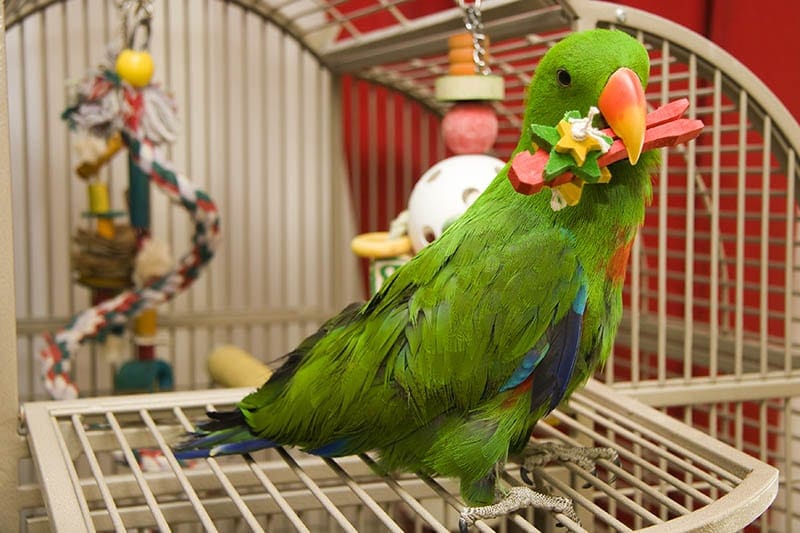
List of Parrot Care Supplies and Costs
| Cage | $50–$1,000 |
| Cage Cover | $20–$50 |
| Perches | $10–$50 |
| Food Dish | $10–$20 |
| Bath | $10–$30 |
| Swing | $10–$20 |
| UV Lamp (optional) | $20–$75 |
| Travel Cage | $30–$150 |
How Much Does a Parrot Cost Per Month?
- $70–$350 per month
Recurring parrot care costs include bedding, food, toys, and vet visits. While not all will factor into every month’s expenditures, budgeting every month will help you identify whether a parrot is financially feasible for you and which species to consider.
Larger parrots are the longest-living varieties and consume much more than small birds, potentially costing several hundred more dollars monthly.
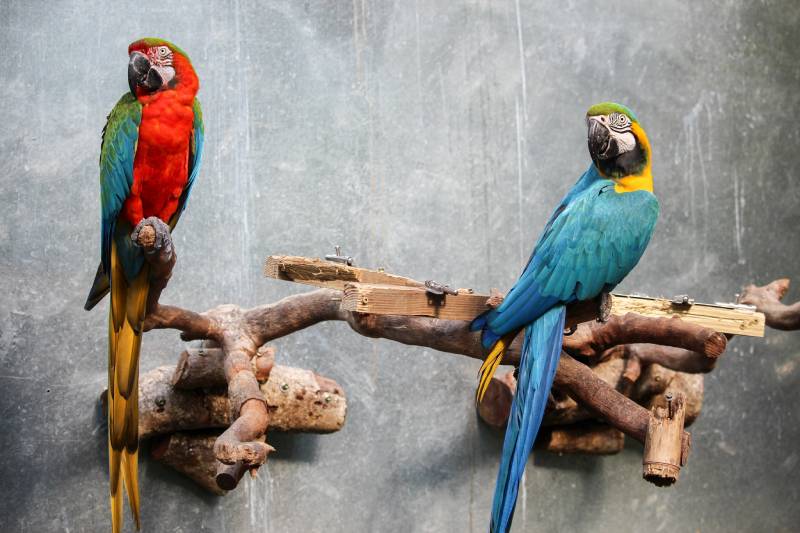
Health Care
- $25–$200 per month
Monthly health care costs generally include first aid kit materials you may need to replenish and pet insurance. The most expensive aspect to budget around is an emergency. Pet insurance plays a vital role in avoiding major financial hits if your parrot falls ill or gets in an accident, but you should still set aside money each month for a reserve fund to cover the upfront vet cost.
Food
- $10–$100 per month
Parrots primarily subsist on a diet of commercial bird pellets that contain the necessary nutritional diversity. Daily feed guidelines range from less than 25 grams for the smallest parrots to over 135 grams for the biggest. As a result, one bag of food may last for several months or only a couple of weeks.
Veggies, fruits, nuts, and treats will fill out the rest of the diet in varying percentages depending on the parrot variety. For instance, seeds can account for up to 50% of a small cockatiel’s diet, while many large parrot species should only have them sparingly, if at all.

Grooming
- $10–$40 per month
Many parrot owners choose to groom at home, and it might be your only option based on the services in your area. Professional grooming costs depend on the bird, with larger birds costing considerably more. Grooming can involve beak trimming, wing clipping, and nail clipping.
Beak trimming is generally a veterinary procedure that may not be necessary for all parrots. Your parrot’s wings require clipping every 1–3 months as they molt. Nails will demand cutting as much as once monthly or as little as once annually, with each parrot variety having different needs.
Medications and Vet Visits
- $0–$10 per month
Annual healthcare costs for parrots are low. Parrots need a few vet visits during their first year, ideally to receive a physical and testing for diseases. Afterward, annual checkups for physicals are all you need to keep your bird healthy.
Your vet will perform a physical during the annual visit and may arrange further blood work, X-rays, or other exams based on their findings. They can also advise on whether your parrot needs any vaccinations, such as the polyomavirus vaccine, though this is often unnecessary for parrots that haven’t been around other birds.
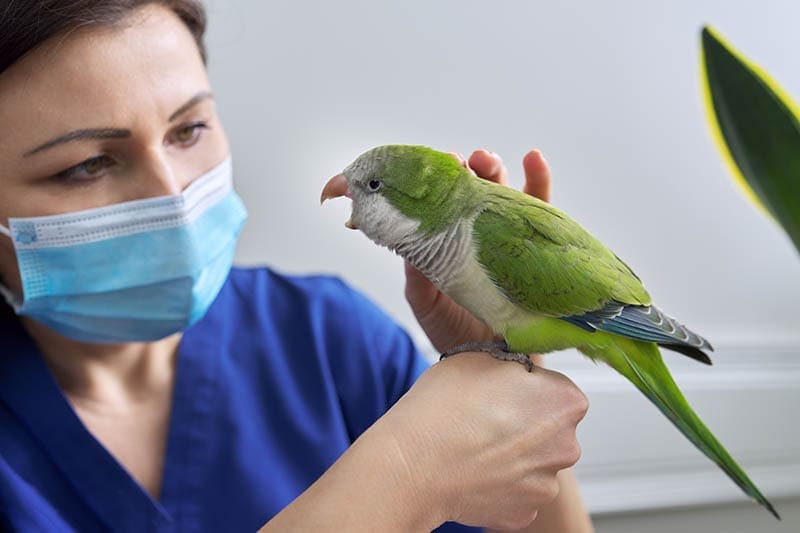
Pet Insurance
- $7–$60 per month
Pet insurance covers accidental injuries or illnesses. After you pay the vet bill, your provider reimburses a percentage of the bill, saving you hundreds on unexpected costs. The only pet insurance available for exotic birds like parrots comes from Nationwide.
They have multiple tiered plans and discounts, starting under $10. Pet Assure has a discount program to help you save on your pet’s medical costs and a Mint Wellness plan to cover routine care.
Environment Maintenance
- $10–$50 per month
Replenishing your parrot’s cage liners and toys is the primary recurring cost you may experience when maintaining their cage. You’ll need natural wood perches with plenty of size, shape, and texture variety to work out your parrot’s feet. As they claw and chew on these materials, you’ll need to swap them out occasionally.
| Cage Liners | $5/month |
| Cleaning Supplies | $5/month |
Entertainment
- $10–$100 per month
Parrots need enrichment to stay happy and avoid boredom and undesirable behaviors. They love to climb, chew, fly, and forage. Giving them a variety of wooden chew toys and other natural materials will keep them mentally stimulated and relaxed.
Swap out toys every week or two to keep items fun and engaging. Set up various activities like forage boxes or food toys stuffed with seeds or grain. Keep certain staples handy, like a cuttlebone, that will give your parrot calcium while trimming their beak.
Total Monthly Cost of Owning a Parrot
- $70–$350 per month
Each month, your concerns for your parrot will be their bags of food and enrichment devices in the cage. Medical bills occur only a few times annually. Since it’s the largest expense, monthly budgeting for vet visits and emergencies is an excellent idea.
Check out pet insurance to find an affordable plan. You can also consider savings accounts for pets that can help pay upfront costs before insurance kicks in or other expenses your plan won’t cover.
Additional Costs to Factor In
Pet-proofing your home is a must for any animal, whether a ground-bound hamster or a flying parrot. Covering cords, protecting against injuries, and taking other precautionary steps may add a few extra dollars to your initial supply costs.
Also, no matter how much you do to keep items out of their mouth, you’ll likely have to replace random wood handles, rubber brush grips, and other chewables around the home.
Otherwise, random costs to consider include boarding or travel expenses, as an overly loud parrot may not be welcome in the cabin of an airplane. Pet-sitters can run $20–$50 per day if you can’t take your parrot on vacation.
The most significant uncertainties are the emergency visits, which can cost over $1,000 in some instances. Infections, broken bones, or GI issues aren’t uncommon if your parrot encounters or consumes a hazardous object or substance, and the price of treatment typically runs at least a few hundred dollars.
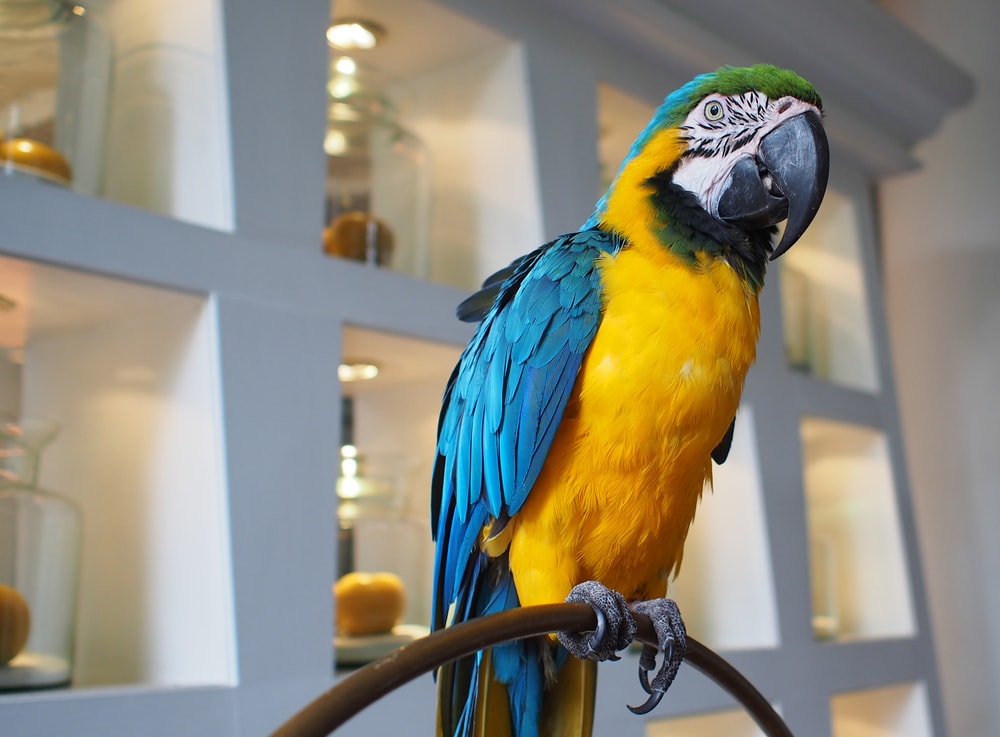
Owning a Parrot on a Budget
The easiest way to save money on a parrot’s initial and ongoing costs is to adopt a small variety. Parakeets, Budgies, Parrotlets, Cockatiels, and other undersized parrots eat less food, require less space, and cost much less money.
By adopting, you get an older parrot at a lower price. With countless parrots needing good homes, it is a chance to help a deserving bird and the animal advocates trying to foster and care for them. Adoptable parrots are over 30 years old in many cases, which may seem daunting. However, the transition to a new home is often much less challenging than with a young parrot from a breeder.
Consider how you source your food, toys, and cage items to save on monthly parrot ownership costs. Buying food in bulk is a great starting point to reduce your expenses. Then, you can find all kinds of easy and fun DIY parrot toys and perches to make. For cage liners, skip the commercial products and repurpose old magazines or newspapers.
Saving Money on Parrot Care
Buying second-hand bird cages and using homemade toys will save you money through the months. But to manage those hard-hitting veterinary expenses that can significantly impact the wallet, the best approach is prevention and anticipation.
Exercise, a high-quality diet, and an accommodating environment will keep your bird as mentally and physically healthy as possible. Spending extra time or money to keep your parrot fit can save you hundreds on medical bills over time. With pet insurance, you’ll have peace of mind over those unexpected occurrences you can’t control.
Conclusion
Depending on the species and the items you buy, initial ownership can run under $500 or exceed $20,000. Month-to-month, owning a parrot may be less than $100 or cost several hundred. The range of initial and ongoing costs is enormous, meaning nearly anyone can find a parrot that can fit their budget.
Although that’s great news if you thought these colorful characters were outside your price range, a parrot isn’t a pet to adopt on impulse. Researching your potential pet from a breed and an individual standpoint is critical before making a decision. Alongside the financial side of owning a parrot, ensuring an appropriate fit in personality will give you and your bird the best chance of a long, happy life together.
See Also:
Featured Image Credit: VH-studio, Shutterstock


